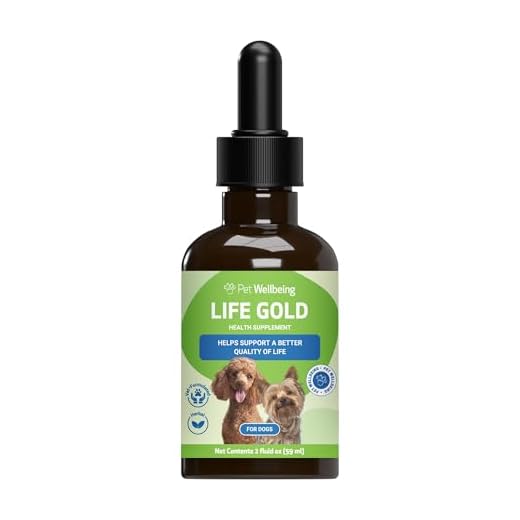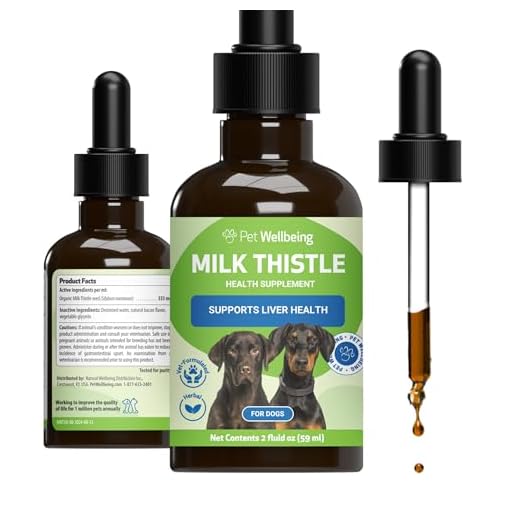




The average survival period for canines diagnosed with hepatic neoplasms varies significantly, often ranging from a few months to a couple of years, depending on several factors such as the tumour’s type, size, and the overall health of the animal. Early detection and timely intervention play critical roles in improving outcomes. Surgical removal of the mass, if feasible, can lead to an extended lifespan, while palliative care focuses on maintaining quality of life.
Regular veterinary check-ups can help in identifying symptoms like jaundice, weight loss, or vomiting, which may indicate underlying issues. If your pet exhibits any of these signs, seeking veterinary advice is paramount. In cases where the neoplasm is malignant, treatment options may include chemotherapy or targeted therapies, which could potentially prolong survival.
It’s essential to monitor your pet closely and adapt their diet and lifestyle according to their needs. Providing a balanced diet, staying active, and ensuring a stress-free environment can significantly contribute to their overall well-being. Discuss with your veterinarian the most suitable care plan tailored for your furry companion.
Survival Expectations for Canines with Hepatic Neoplasms
Median survival time for pets diagnosed with hepatic neoplasms varies significantly, typically ranging from a few months to over a year. Factors influencing outcomes include the type of neoplasm, whether it is benign or malignant, size, and extent of the disease. Surgical removal of the neoplasm can lead to improved prognosis, especially if detected early. Pets undergoing surgery might enjoy an extended survival of 12 months or more, while those receiving only palliative care may have a shorter timeframe, often around three to six months.
Importance of Early Detection
Timely diagnosis is paramount. Regular veterinary check-ups help in identifying potential issues before they escalate. Routine blood tests and ultrasounds can reveal abnormalities in liver function, enabling early intervention. If your furry friend exhibits symptoms like vomiting, weight loss, or lethargy, consult a vet immediately. Early detection could significantly impact the management plan and overall prognosis.
Treatment Options and Their Impact
Treatment options include surgery, chemotherapy, and supportive care. Each approach has different implications for survival. Surgical intervention, when feasible, often offers the best chance for extended life. Chemotherapy may be employed for malignancies but comes with variable success rates. Supportive care, including dietary adjustments and medications, plays a critical role in enhancing quality of life, even if it does not directly extend survival. A tailored treatment plan, developed in consultation with a veterinary oncologist, is essential for optimising outcomes.
Understanding Liver Tumours in Dogs
Early detection plays a critical role in managing hepatic neoplasms. Regular veterinary check-ups are crucial. Routine blood tests, ultrasound imaging, and biopsies provide insights into the condition of the organ and assist in formulating a treatment plan.
Types of Hepatic Neoplasms
- Hepatocellular Carcinoma: The most common type, often aggressive. It may spread quickly, requiring immediate attention.
- Cholangiocarcinoma: Arises from bile ducts and is typically more challenging to treat.
- Benign Tumours: Such as hepatic adenomas, these may not require aggressive treatment but still warrant monitoring.
Symptoms to Watch For
- Weight loss or decreased appetite.
- Vomiting or nausea.
- Abdominal swelling or discomfort.
- Jaundice, indicated by yellowing of the skin or eyes.
- Lethargy or decreased activity levels.
Recognising these signs early can significantly improve outcomes. If you notice any of these symptoms, seek veterinary assistance promptly. Early intervention often leads to better management options and enhanced quality of life.
Common Symptoms of Liver Tumours
Weight loss is a frequent indication of abnormality in the body. A noticeable decrease in appetite often accompanies this symptom, leading to a lack of energy and lethargy. If you observe your furry companion becoming less interested in meals, it’s time to consult a veterinarian.
Abdominal Distension
Swelling or distension in the abdomen may signal fluid accumulation, a consequence of liver dysfunction. This can manifest as a bloated appearance, which can be distressing to witness. Monitoring for sudden changes in the shape or size of the belly is crucial.
Vomiting and Diarrhoea
Gastrointestinal disturbances such as vomiting and diarrhoea may arise due to liver issues. These symptoms can lead to dehydration and further complications, so timely veterinary intervention is necessary if they persist. Pay attention to any changes in stool consistency or frequency.
Diagnosis Methods for Liver Tumours
Ultrasound examination serves as a primary approach for identifying abnormal growths in the hepatic area. This non-invasive procedure allows for real-time imaging, enabling veterinarians to assess the size, shape, and number of masses present. If a suspicious lesion is detected, a fine needle aspiration (FNA) can be performed to obtain a sample of the tissue for cytological analysis. This technique is minimally invasive and can provide preliminary information about the nature of the mass.
Imaging Techniques
X-rays may complement ultrasound findings by revealing any potential spread of the malignancy to other organs. However, they are generally less effective for spotting small lesions. CT scans offer a more detailed view, allowing for precise measurement and evaluation of vascular involvement, which is crucial for determining the treatment approach.
Biopsy Procedures
A more definitive diagnosis often requires a biopsy. This procedure can be performed either through FNA or via a surgical approach, depending on the lesion’s accessibility and the veterinarian’s recommendations. Histopathological examination of the obtained tissue provides conclusive information about the type of neoplasm and its aggressiveness, guiding further treatment options.
Treatment Options for Dogs with Liver Tumours
Surgical removal of the affected tissue presents a viable option for certain cases. If the mass is accessible and the surrounding tissue appears healthy, a veterinarian may recommend surgery. This can lead to improved quality of life and extended duration of health.
Medical Management
When surgery isn’t feasible, medical management becomes essential. This may include medications to support liver function, control symptoms, and enhance metabolism. Specific drugs can help alleviate discomfort and manage complications arising from the growth. Regular monitoring is vital to adjust treatments as needed.
Dietary Adjustments
Implementing a special diet tailored for liver health is beneficial. High-quality, easily digestible protein sources can support recovery. Incorporating antioxidants and omega-3 fatty acids may also promote overall well-being. Consulting a veterinary nutritionist for personalised recommendations is advisable.
| Treatment Type | Description |
|---|---|
| Surgery | Removal of tumour if operable, aiming for complete excision. |
| Medications | Drugs to enhance liver function and manage symptoms. |
| Dietary Changes | Specialised nutrition to support liver health and digestion. |
| Follow-Up Care | Regular veterinary check-ups to monitor condition and adapt treatment. |
Exploring holistic approaches, such as acupuncture or herbal supplements, may offer additional support. Collaborating closely with a veterinary oncologist helps ensure a well-rounded treatment plan.
Factors Influencing Lifespan with a Liver Tumour
The prognosis for a canine affected by a hepatic mass varies significantly based on several factors. The type and grade of the neoplasm play a crucial role. Benign growths generally provide a more optimistic outlook compared to malignant neoplasms, which can be aggressive and spread to other organs. Early detection is also vital; the sooner the condition is identified, the better the chances of effective intervention.
Age and Overall Health
The age of a canine at diagnosis influences longevity as older pets may have pre-existing health conditions. A younger individual with a robust immune system typically handles treatment better, leading to an improved prognosis. Nutritional status is another consideration; a balanced diet, such as the best ancient grain dog food, can enhance recovery and support overall health.
Treatment Choices
The options selected for addressing the growth also impact survival. Surgical removal of the mass, if feasible, tends to yield the best outcomes. Chemotherapy or palliative care may be necessary for more advanced cases, but these approaches can vary in effectiveness. Regular follow-ups and monitoring are essential to adapt the treatment plan as needed.
Supportive Care for Dogs with Liver Tumours
Providing proper supportive care is crucial for pets diagnosed with hepatic masses. Focus on a nutritious diet specifically formulated for liver health. Look for options that include high-quality proteins, easily digestible carbohydrates, and essential fatty acids. Consult your veterinarian for tailored dietary recommendations, as they can guide you in selecting the best food for your furry friend.
Hydration and Supplements
Maintain adequate hydration. Fresh water should always be available, as hydration aids in overall organ function. Consider integrating supplements like milk thistle, SAMe (S-adenosylmethionine), or omega-3 fatty acids after discussing them with your vet. These can support liver function and provide additional nutrients that may be lacking.
Monitoring and Comfort
Regular check-ups are vital to monitor progress and adjust care as necessary. Pay attention to any changes in behaviour, appetite, or energy levels. Creating a comfortable environment at home can significantly enhance your pet’s quality of life. Soft bedding, a quiet space, and limited stressors can help your companion feel more at ease.






